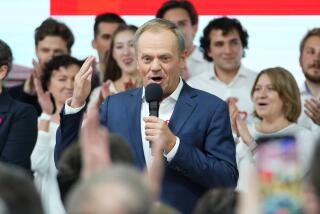Solidarity Can’t Decide on Poland Candidate
- Share via
WARSAW — Solidarity’s newly elected National Assembly members met Saturday to debate whether to support a Communist candidate for president, but they ended their boisterous meeting by putting off the decision until later this week.
The 259 new senators and deputies to the Sejm, the lower house of Parliament, argued hotly behind the closed doors of a meeting room in the Parliament building, their debate energized by the apparent withdrawal Friday of the Communist Party leader, Wojciech Jaruzelski, as a presidential candidate.
Jaruzelski, 65, announced his surprise withdrawal at a Central Committee meeting Friday, noting that the Polish public associated him more with the 1981 imposition of martial law than with the political reforms he had helped to engineer.
The Communist Party leadership asked Jaruzelski to reconsider his withdrawal, but Jaruzelski made no immediate response. In his withdrawal statement, Jaruzelski endorsed his close confidant, Interior Minister Czeslaw Kiszczak, another army general.
Solidarity leader Lech Walesa, who traveled from Gdansk to lead the meeting Saturday, apparently was arguing in support of Kiszczak, who led the government’s delegation in the round-table discussions that led to Solidarity’s reinstatement as a legal trade union.
“Whether it’s Jaruzelski or Kiszczak, it is an internal problem of the government coalition,” Walesa told journalists before the meeting. “It seems in this concrete situation that Gen. Kiszczak has bigger chances.”
In the arrangement arrived at in the round-table talks, the Communist Party and its coalition, with an assured majority in the Sejm, would put forward its candidate for the newly created office of president. It had been acknowledged by both sides that Jaruzelski would be that candidate.
But the Communists, thrown into turmoil by the party’s poor showing in last month’s elections, have been troubled by a breakdown in party discipline, as its members try to reposition themselves for what promises to be a new age in Polish politics.
In addition to his sense that the broad Polish public opposes his presidency, Jaruzelski may have been strongly influenced in his withdrawal announcement by the hesitation of two smaller parties inside the Communist coalition to back his candidacy.
The Communist coalition, at full strength, has an edge of 300 to 259 counting both the Sejm and the upper house, the Senate, whose members will vote jointly to choose the president. But the votes of both the Peasants Party, with 76 Sejm deputies, and the Democratic Party, with 27, would be required to elect any Communist nominee.
Reluctant to Back Candidate
The Solidarity legislators could throw their support behind the candidate, but they have been reluctant to do so--even though they are not putting forward their own candidate--because they do not want to be seen as supporting the Communists.
“We would be in terrible trouble if we voted for the Communist candidate,” said Jan Litynski, a Solidarity Sejm deputy and a longtime Solidarity activist. “The people would be outraged. We could not get away with it.”
While some Solidarity members were clearly relishing the organization’s new kingmaker role in Polish politics, Litynski acknowledged that the situation could become dangerously unstable if a deadlock prevents the selection of the president within a few days.
The first meeting of the new Sejm is expected on Tuesday, with a full session of both the Senate and the Sejm to follow on Thursday. The latter would be the first meeting at which a vote on the president could be taken.
Spokesman Janusz Onyskiewicz said the Solidarity legislators will meet again Wednesday to decide whether to support Kiszczak, Jaruzelski or another candidate.
More to Read
Sign up for Essential California
The most important California stories and recommendations in your inbox every morning.
You may occasionally receive promotional content from the Los Angeles Times.













